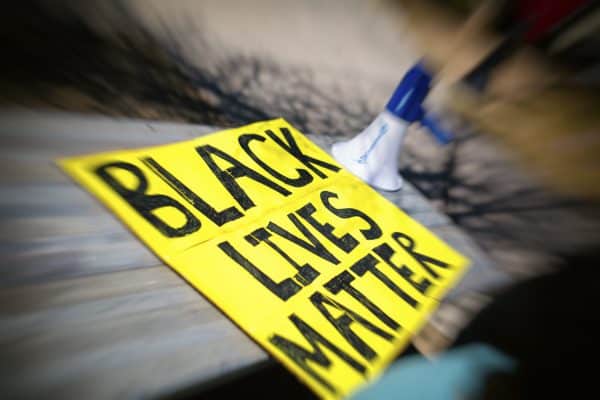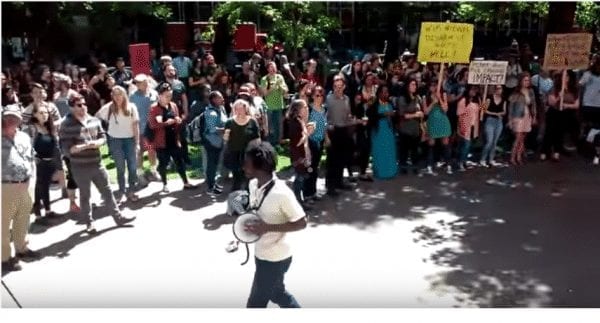The Racist Killing Machine in the Age of Anti-Politics
![]() Henry A. Giroux
Henry A. Giroux
Cultural Critic and Public Intellectual

“Black Lives Should Matter” (187 Killed by police (KbP) as of 7/10/2016). Stats from Mapping Violence. Graphic by Rowan Wolf
The killing machine has become spectacularized, endlessly looped through the mainstream cultural apparatuses both as a way to increase ratings and as an unconscious testimony to the ruthlessness of the violence waged by a racist state. Once again, Americans and the rest of the world are witness to a brutal killing machine, a form of domestic terrorism, responsible for the deaths of Philando Castile and Alton Sterling who were shot point blank by white policemen who follow the script of a racist policy of disposability that suggests that black lives not only do not matter, but that black people can be killed with impunity since the police in the United States are rarely held accountable for such crimes.
In the Castile case, the police fired into the car with a child in the back seat–a point rarely mentioned in the mainstream press. At the same time, the power of violence as a tool for expending rage and addressing deeply felt injustices has resulted in a young black man mimicking the tools of state violence by deliberately killing five police officers and wounding seven others in Dallas, Texas. This is a horrendous and despicable act of violence but it must be understood in a system in which violence is disproportionately waged against poor blacks, immigrants, Muslims, and others who are now defined as excess and pathologized as disposable. The killings in Dallas speak to a brutal mindset and culture of mistrust and fear in which violence has become the only legitimate form of mediation
In the increasingly violent landscape of anti-politics, mediation disappears, dissent is squelched, repression operates with impunity, the ethical imagination withers, and the power of representation is on the side of spectacularized state violence. Violence both at the level of the state and in the hands of everyday citizens has become a substitute for genuine forms of agency, citizenship, and mutually informed dialogue and community interaction.
Etienne Balibar has pointed out that “as citizenship is emptied of its content,”[i] the right to be represented is ceded to the financial elite and the institutions of repression or what Althusser once called the “repressive state apparatuses.” Under such circumstances, politics is replaced by a form of “antipolitics” in which the representative and repressive machineries of the state combine to objectify, dehumanize, and humiliate through racial profiling, eliminate crucial social provisions, transform poor black neighborhoods into war zones, militarize the police, undermine the system of justice, and all too willingly use violence to both to punish blacks and to signal to them that any form of dissent can cost them their lives. But such apparatuses do more, they willfully exclude and repress the historical memories of racial violence waged by both the police and other racist institutions.[ii] They have no choice since such histories point to the deeply embedded structural nature of such violence as a reproach to the bad cops theory of racist violence.
What we are observing is not simply the overt face of a militarized police culture, the lack of community policing, deeply entrenched anti-democratic tendencies, or the toxic consequences of a culture of violence that saturates every day life. We are in a new historical era, one that is marked a culture of lawlessness, extreme violence, and disposability, fueled, in part, by a culture of fear, a war on terror, and a deeply overt racist culture that is unapologetic in its disciplinary and exclusionary practices. This deep seated racism is reinforced by a culture of cruelty that is the modus operandi of neoliberal capitalism–a cage culture, a culture of combat, a hyper masculine culture that views killing those most vulnerable as sport, entertainment, and policy.
The United States is in the midst of a crisis of of governance, authority, and representation and as historical narratives of injustice and resistance fade there emerges a further crisis of individual and collective agency, along with a crisis of the identity and purpose regarding the very meaning of governance. As democratic public spheres disappear and the state increasing turns to violence to address social problems, lawlessness becomes normalized and violence becomes the only form of mediation. This is fueled by a discourse of objectification, and a race-based culture of pathology, which often finds expression not only in police violence but also in scattered mass shootings and a tsunami of everyday violence in America’s major cities, such as Chicago. Politics has been emptied out, lacking any representative substance, and opens the social landscape to the dangerous forces of right-wing populism and ultra-nationalism, both of which are deeply racist in their ideological discourse and their relationship to those excluded others.
Americans are witnessing not simply the breakdown of democracy but the legitimization of a society in the grips of what might be called a politics of domestic terrorism, a kind of anti-politics that rejects the underlying values of a democracy and is unwilling to reclaim its democratic tendencies while deepening its civic principles. The U.S. is deep into the entrails of an updated authoritarianism and until that is recognized under such circumstances violence will escalate, people of color will be killed, whites will claim they are the real victims, and the discourse of racial objectification will become, as it has, a visible if not embraced signpost of an anti-politics that defines the varied landscapes of power and institutions of everyday life.
The ultimate mark of terrorism both domestic and foreign is a hatred of the other, a certainty that defines dialogue, an ignorance that embraces the power of the mob and the redemptive force of the savior. As America moves dangerously close to embracing such an authoritarian social order and the politicians who endorse it, indiscriminate and intolerable violence will assume a kind of legitimacy that allows people to look away, refuse to recognize their own powerlessness, and align them with a barbarism in the making. All of this bears the weight of a history in which such indifference is easily transformed into the worst forms of state violence. The face of white supremacy and state terrorism, with its long legacy of slavery, lynching, and brutality has become normalized, if not supported by one major political party, a large percentage of the public endorsing Donald Trump, and a corporate and financial elite wedded only to increasing their power and profits. We are in a new historical era that is widening the scope and range of violence-an expansive age of disposability that widens the net of those considered expendable if not dangerous.
Some conservatives such as David Brooks have argued that the collapse of character and the rise of a form of political narcissism are producing deeply troubling forms of authoritarianism.[iii] That analysis is too facile, and ignores the underlying social, economic, and political conditions that concentrate power in very few hands, distribute wealth largely to the upper 1 percent, eliminate social services, and destroy those institutions capable of producing a culture of critique, empathy, and engaged citizenship. The old age of the social contract and social democracy is dead; the economic foundations that once supported large segments of the working class have been destroyed by the forces of globalization; and the promise of a collective ethical imagination has given way to the tawdry self-indulgence and self-interest that drives a consumer and celebrity culture. Not only have too many Americans become prisoners of their own experience, they also have become passive in the face of state violence, a culture of extreme violence, and a web of mainstream cultural apparatuses that trade in violence as sport and entertainment.
Racism is one register of such violence, but in the age of cell phones and video cameras it has become more visible, and its brutalizing imagery contains the possibility for mobilizing social formations such as the Black Lives Matter Movement to both expose and eliminate its underlying ideologies and structures. At the same time, such blatant acts of racism offer a false sense of community to those being organized around hate and anger, resulting in a blind devotion to false prophets, such as Donald Trump, who trade in fear and despair.
Let’s hope that the current crisis we are witnessing as it appears to unfold daily will transform cries of collective outrage into a social movement that is organized around a call for economic and social justice, one less intent on calling for reforms than for eliminating a neoliberal economic order steeped in corruption, racism, and violence.
Notes.
[i] Etienne Balibar, “Uprisings in Banlieues,” Equaliberty, [Durham: Duke University, 2014] pp. 252
[ii] See, for instance, Jerome H. Skolnick, The Politics of Protest: Task Force on Violent Aspects of Protest and Confrontation of the National Commission on the Causes and Prevention of Violence 2nd Revised edition (New York: NYU Press, 2010). Also see Jonathan Simon, Governing Through Crime: How the War on Crime Transformed American Democracy and Created a Culture of Fear (New York: Oxford University Press, 2009).
[iii] David Brooks, “The Governing Cancer of Our Times,” The New York Times, [February 26, 2016] Online: http://www.nytimes.com/2016/02/26/opinion/the-governing-cancer-of-our-time.html?_r=0
Cross-posted with CounterPunch.
![]()
 Currently holds the Global TV Network Chair Professorship at McMaster University in the English and Cultural Studies Department and a Distinguished Visiting Professorship at Ryerson University. His books include: Zombie Politics and Culture in the Age of Casino Capitalism (Peter Land 2011), On Critical Pedagogy (Continuum, 2011), Twilight of the Social: Resurgent Publics in the Age of Disposability (Paradigm 2012), Disposable Youth: Racialized Memories and the Culture of Cruelty (Routledge 2012), Youth in Revolt: Reclaiming a Democratic Future (Paradigm 2013). Giroux’s most recent books are America’s Education Deficit and the War on Youth (Monthly Review Press, 2013), are Neoliberalism’s War on Higher Education, America’s Disimagination Machine (City Lights) and Higher Education After Neoliberalism (Haymarket) will be published in 2014). He is also a Contributing Editor of Cyrano’s Journal Today / The Greanville Post, and member of Truthout’s Board of Directors and has his own page The Public Intellectual. His web site is www.henryagiroux.com.
Currently holds the Global TV Network Chair Professorship at McMaster University in the English and Cultural Studies Department and a Distinguished Visiting Professorship at Ryerson University. His books include: Zombie Politics and Culture in the Age of Casino Capitalism (Peter Land 2011), On Critical Pedagogy (Continuum, 2011), Twilight of the Social: Resurgent Publics in the Age of Disposability (Paradigm 2012), Disposable Youth: Racialized Memories and the Culture of Cruelty (Routledge 2012), Youth in Revolt: Reclaiming a Democratic Future (Paradigm 2013). Giroux’s most recent books are America’s Education Deficit and the War on Youth (Monthly Review Press, 2013), are Neoliberalism’s War on Higher Education, America’s Disimagination Machine (City Lights) and Higher Education After Neoliberalism (Haymarket) will be published in 2014). He is also a Contributing Editor of Cyrano’s Journal Today / The Greanville Post, and member of Truthout’s Board of Directors and has his own page The Public Intellectual. His web site is www.henryagiroux.com.
=SUBSCRIBE TODAY! NOTHING TO LOSE, EVERYTHING TO GAIN.=
free • safe • invaluable
[email-subscribers namefield=”YES” desc=”” group=”Public”]








